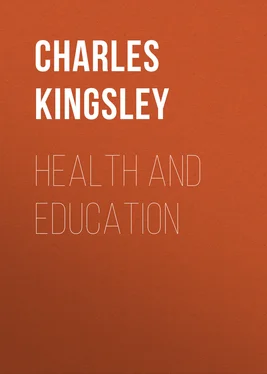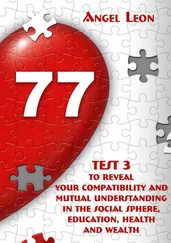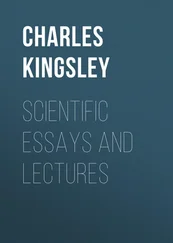Charles Kingsley - Health and Education
Здесь есть возможность читать онлайн «Charles Kingsley - Health and Education» — ознакомительный отрывок электронной книги совершенно бесплатно, а после прочтения отрывка купить полную версию. В некоторых случаях можно слушать аудио, скачать через торрент в формате fb2 и присутствует краткое содержание. Жанр: Медицина, Здоровье, foreign_edu, на английском языке. Описание произведения, (предисловие) а так же отзывы посетителей доступны на портале библиотеки ЛибКат.
- Название:Health and Education
- Автор:
- Жанр:
- Год:неизвестен
- ISBN:нет данных
- Рейтинг книги:4 / 5. Голосов: 1
-
Избранное:Добавить в избранное
- Отзывы:
-
Ваша оценка:
- 80
- 1
- 2
- 3
- 4
- 5
Health and Education: краткое содержание, описание и аннотация
Предлагаем к чтению аннотацию, описание, краткое содержание или предисловие (зависит от того, что написал сам автор книги «Health and Education»). Если вы не нашли необходимую информацию о книге — напишите в комментариях, мы постараемся отыскать её.
Health and Education — читать онлайн ознакомительный отрывок
Ниже представлен текст книги, разбитый по страницам. Система сохранения места последней прочитанной страницы, позволяет с удобством читать онлайн бесплатно книгу «Health and Education», без необходимости каждый раз заново искать на чём Вы остановились. Поставьте закладку, и сможете в любой момент перейти на страницу, на которой закончили чтение.
Интервал:
Закладка:
This has been, and will be perhaps for many a century to come, almost the most fearful failing of this poor, exceptional, over-organised, diseased, and truly fallen being called man, who is in doubt daily whether he be a god or an ape; and in trying wildly to become the former, ends but too often in becoming the latter.
For man, whether savage or civilised, feels, and has felt in every age, that there is something wrong with him. He usually confesses this fact—as is to be expected—of his fellow-men, rather than of himself; and shows his sense that there is something wrong with them by complaining of, hating, and killing them. But he cannot always conceal from himself the fact that he, too, is wrong, as well as they; and as he will not usually kill himself, he tries wild ways to make himself at least feel—if not to be—somewhat “better.” Philosophers may bid him be content; and tell him that he is what he ought to be, and what nature has made him. But he cares nothing for the philosophers. He knows, usually, that he is not what he ought to be; that he carries about with him, in most cases, a body more or less diseased and decrepit, incapable of doing all the work which he feels that he himself could do, or expressing all the emotions which he himself longs to express; a dull brain and dull senses, which cramp the eager infinity within him; as—so Goethe once said with pity—the horse’s single hoof cramps the fine intelligence and generosity of his nature, and forbids him even to grasp an object, like the more stupid cat, and baser monkey. And man has a self, too, within, from which he longs too often to escape, as from a household ghost; who pulls out, at unfortunately rude and unwelcome hours, the ledger of memory. And so when the tempter—be he who he may—says to him “Take this, and you will ‘feel better’—Take this, and you shall be as gods, knowing good and evil:” then, if the temptation was, as the old story says, too much for man while healthy and unfallen, what must it be for his unhealthy and fallen children? In vain we say to man—
“’Tis life, not death, for which you pant;
’Tis life, whereof your nerves are scant;
More life, and fuller, that you want.”
And your tree of knowledge is not the tree of life: it is, in every case, the tree of death; of decrepitude, madness, misery. He prefers the voice of the tempter—“Thou shalt not surely die.” Nay, he will say at last,—“Better be as gods awhile, and die: than be the crawling, insufficient thing I am; and live.”
He—did I say? Alas! I must say she likewise. The sacred story is only too true to fact, when it represents the woman as falling, not merely at the same time as the man, but before the man. Only let us remember that it represents the woman as tempted; tempted, seemingly, by a rational being, of lower race, and yet of superior cunning; who must, therefore, have fallen before the woman. Who or what the being was, who is called the Serpent in our translation of Genesis, it is not for me to say. We have absolutely, I think, no facts from which to judge; and Rabbinical traditions need trouble no man much. But I fancy that a missionary, preaching on this story to Negroes; telling them plainly that the “Serpent” meant the first Obeah man; and then comparing the experiences of that hapless pair in Eden, with their own after certain orgies not yet extinct in Africa and elsewhere, would be only too well understood: so well, indeed, that he might run some risk of eating himself, not of the tree of life, but of that of death. The sorcerer or sorceress tempting the woman; and then the woman tempting the man; this seems to be, certainly among savage peoples, and, alas! too often among civilised peoples also, the usual course of the world-wide tragedy.
But—paradoxical as it may seem—the woman’s yielding before the man is not altogether to her dishonour, as those old monks used to allege who hated, and too often tortured, the sex whom they could not enjoy. It is not to the woman’s dishonour, if she felt, before her husband, higher aspirations than those after mere animal pleasure. To be as gods, knowing good and evil, is a vain and foolish, but not a base and brutal, wish. She proved herself thereby—though at an awful cost—a woman, and not an animal. And indeed the woman’s more delicate organisation, her more vivid emotions, her more voluble fancy, as well as her mere physical weakness and weariness, have been to her, in all ages, a special source of temptation which it is to her honour that she has resisted so much better than the physically stronger, and therefore more culpable, man.
As for what the tree of knowledge was, there really is no need for us to waste our time in guessing. If it was not one plant, then it was another. It may have been something which has long since perished off the earth. It may have been—as some learned men have guessed—the sacred Soma, or Homa, of the early Brahmin race; and that may have been a still existing narcotic species of Asclepias. It certainly was not the vine. The language of the Hebrew Scripture concerning it, and the sacred use to which it is consecrated in the Gospels, forbid that notion utterly; at least to those who know enough of antiquity to pass by, with a smile, the theory that the wines mentioned in Scripture were not intoxicating. And yet—as a fresh corroboration of what I am trying to say—how fearfully has that noble gift to man been abused for the same end as a hundred other vegetable products, ever since those mythic days when Dionusos brought the vine from the far East, amid troops of human Mænads and half-human Satyrs; and the Bacchæ tore Pentheus in pieces on Cithæron, for daring to intrude upon their sacred rites; and since those historic days, too, when, less than two hundred years before the Christian era, the Bacchic rites spread from Southern Italy into Etruria, and thence to the matrons of Rome; and under the guidance of Pœnia Annia, a Campanian lady, took at last shapes of which no man must speak, but which had to be put down with terrible but just severity, by the Consuls and the Senate.
But it matters little, I say, what this same tree of knowledge was. Was every vine on earth destroyed to-morrow, and every vegetable also from which alcohol is now distilled, man would soon discover something else wherewith to satisfy the insatiate craving. Has he not done so already? Has not almost every people had its tree of knowledge, often more deadly than any distilled liquor, from the absinthe of the cultivated Frenchman, and the opium of the cultivated Chinese, down to the bush-poisons wherewith the tropic sorcerer initiates his dupes into the knowledge of good and evil, and the fungus from which the Samoiede extracts in autumn a few days of brutal happiness, before the setting in of the long six months’ night? God grant that modern science may not bring to light fresh substitutes for alcohol, opium, and the rest; and give the white races, in that state of effeminate and godless quasi-civilisation which I sometimes fear is creeping upon them, fresh means of destroying themselves delicately and pleasantly off the face of the earth.
It is said by some that drunkenness is on the increase in this island. I have no trusty proof of it: but I can believe it possible; for every cause of drunkenness seems on the increase. Overwork of body and mind; circumstances which depress health; temptation to drink, and drink again, at every corner of the streets; and finally, money, and ever more money, in the hands of uneducated people, who have not the desire, and too often not the means, of spending it in any save the lowest pleasures. These, it seems to me, are the true causes of drunkenness, increasing or not. And if we wish to become a more temperate nation, we must lessen them, if we cannot eradicate them.
Читать дальшеИнтервал:
Закладка:
Похожие книги на «Health and Education»
Представляем Вашему вниманию похожие книги на «Health and Education» списком для выбора. Мы отобрали схожую по названию и смыслу литературу в надежде предоставить читателям больше вариантов отыскать новые, интересные, ещё непрочитанные произведения.
Обсуждение, отзывы о книге «Health and Education» и просто собственные мнения читателей. Оставьте ваши комментарии, напишите, что Вы думаете о произведении, его смысле или главных героях. Укажите что конкретно понравилось, а что нет, и почему Вы так считаете.












